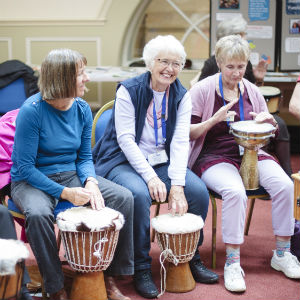Music therapy is the use of musical instruments/equipment and the sounds they make, within a therapeutic relationship, to promote change and recovery.
Music can communicate where words fail, making it an ideal medium for exploring experiences and feelings, which may initially be too hard to verbalise. Music therapy is an effective alternative to counselling and psychotherapy, especially when people are finding verbal communication difficult or inadequate, or having problems relating to others. Read more about how music therapy supports mental health.
Music therapy often involves a mix of music and talking and the balance of this varies over the course of the therapy and depending on people’s needs and what feels more comfortable. Music therapy can involve improvised instrumental music, song writing, listening to music or singing. Whichever way the music is used in the session, it is an opportunity for expression and communication and is a way of building a supportive relationship with the therapist and the group (if applicable).
The therapist improvises music with clients in a way that supports, encourages and contains their music/sounds. Self-expression and interaction are invited and facilitated. This evolving, therapeutic relationship is central to how music therapy works.
If music therapy is happening in longer-term groups, trust and understanding between group members in the sessions can also develop. These group relationships, supported by therapists, can be useful in recovery, offering insight, hope and motivation.
There’s no need for any musical skills or experience to take part in music therapy, although some people come with this background and this is also welcome. Everyone can relate to music. In Music Therapy, we say there is no right or wrong way of playing as instead of working towards learning a piece of music or trying to play in a particular way, the music will be a reflection of how you are feeling in that moment. As a result, the music is often quite free and flexible and the music therapists will support what you play with their music.
The therapeutic effects are very individual and can change over time. In the moment, the music might help ease anxiety, help you to feel less isolated or support your mood. It is also a good way of being present and getting out of our heads and connected with how we’re feeling. It can also be helpful to express difficult feelings and emotions in the music and have an outlet for this.
You can find out more about our services here or read more about what to expect from one of our music therapy sessions here.
To find out more about music therapy in the UK, visit the British Association of Music Therapy website.




